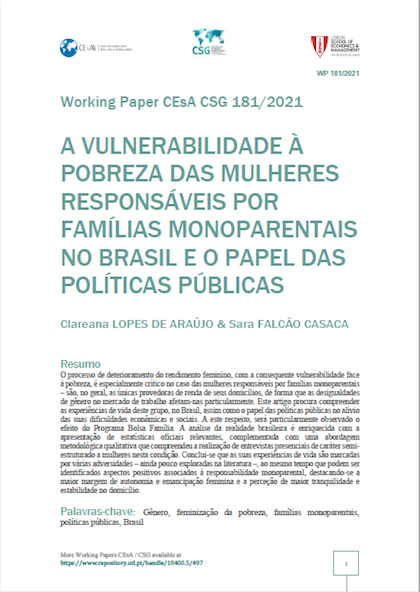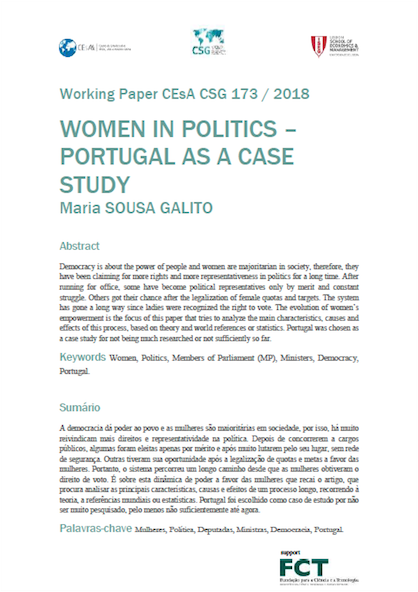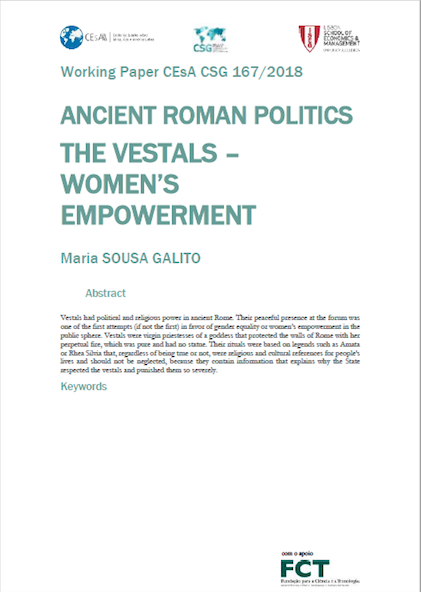Gender Studies

Working Paper 181/2021: A Vulnerabilidade à Pobreza das Mulheres Responsáveis por Famílias Monoparentais no Brasil e o Papel das Políticas Públicas
Abstract:
The deterioration of women’s income, and their consequent vulnerability to poverty, is particularly critical in the case of women who are the head of single-parent families – being them the only provider to the household, gender inequalities in the labor market affect them more significantly. A Vulnerabilidade à Pobreza das Mulheres Responsáveis por Famílias Monoparentais no Brasil e o Papel das Políticas Públicas seeks to understand the life experiences of these women, in Brazil, as well as the role of the State in alleviating their economic and social difficulties, where the effect of the Bolsa Família Programme will be studied in particular. The analysis of the Brazilian reality is enhanced by the presentation of relevant official statistics, complemented by a qualitative methodological approach based on semi-structured interviews conducted with women in this situation. It is concluded that their life experiences are affected by several hardships that are still relatively under-researched, but also by positive aspects related to their condition as single parents, above all in terms of their autonomy and perception of greater emancipation, as well as living in a safe and emotionaly stable environment.
Quotation:
Araújo, Clareana Lopes de e Sara Falcão Casaca (2021). “A vulnerabilidade à pobreza das mulheres responsáveis por famílias monoparentais no Brasil e o papel das políticas públicas”. Instituto Superior de Economia e Gestão – CEsA/ CSG – Documentos de Trabalho nº 181/2021.

Working Paper 173/2018: Women in Politics: Portugal as a case study
Abstract:
Democracy is about the power of the people. In order to sustain, implies (at least) representativeness of its major groups. When majority rules minorities, lobbies complain when not happy and some of their demands are met; but the system doesn’t turn totally in their favor if it goes against the interests of a larger assembly. When minority rules the majority, problems arise (populism against elite, for instance); and sooner or later there’s a significant shift in society. Quantity gives power. Numbers do count in Democracy. Women are the majority of the population. It was not always so, but nowadays it’s an unquestionable fact. For cultural, institutional or socioeconomic reasons they were submissive for centuries to a system that did not recognize their public activity. They were not involved in decision making and rebel against that. At first, their demands were not met. But waves are changing. As long as democracy prevails and women’s numbers and percentages won’t drop, they’ll probably continue to raise awareness to their cause, increasing their power and influence in society. The evolution of women’s empowerment is the focus of Women in Politics: Portugal as a case study, that tries to analyze the main characteristics, causes and effects of this process, based on theory and world references or statistics. Portugal was chosen as a case study for not being much researched or not sufficiently so far.
Quotation:
Galito, Maria Sousa (2018). “Women in politics : Portugal as a case study”. Instituto Superior de Economia e Gestão – CEsA/ CSG – Documentos de Trabalho nº 173/2018.

Working Paper 167/2018: Ancient Roman Politics the Vestals – Women’s empowerment
Resumo:
Ancient Roman Politics the Vestals – Women’s empowerment is about vestal virgins of ancient Rome. First chapter concerns goddess Vesta, her legends and what she represented. Second chapter is about who Vesta and why her priestesses were important to roman religion. Third chapter explains where they lived. Four chapter lists names of known vestals until Emperor Tiberius (a larger list is included in Appendix 2) and discusses situations involving their deaths or role model. Vestals had political and religious power in ancient Rome. Their peaceful presence at the forum was one of the first attempts (if not the first) in favor of gender equality or women’s empowerment in the public sphere. Vestals were virgin priestesses of a goddess that protected the walls of Rome with her perpetual fire, which was pure and had no statue. Their rituals were based on legends such as Amata or Rhea Silvia that, regardless of being true or not, were religious and cultural references for people’s lives and should not be neglected, because they contain information that explains why the State respected the vestals and punished them so severely.
Citação:
Galito, Maria Sousa (2018). “Ancient roman politics the vestals – women’s empowerment”. Instituto Superior de Economia e Gestão – CEsA/ CSG Documentos de Trabalho nº 167/2018.





